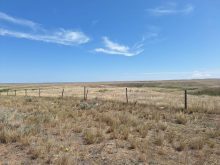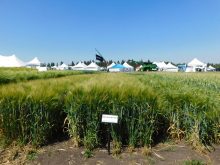In the second week of December, about 50 staff at Alberta Agriculture and Forestry got a pre-Christmas delivery no one would want — they were laid off.
Details have not been released but among those affected are engineers, agrologists, and managers.
“This is just another example of where they have taken some significant steps backwards,” said Ross McKenzie, a longtime provincial agronomy research scientist who retired six years ago but has kept in touch with many colleagues.
“The few people they have doing work outside Edmonton; those people have been lost.”
McKenzie said he knows of 12 people who have been let go in southern Alberta. Only one of them was a manager, and most were researchers. (Many professionals with the ministry are not union members, and there are unconfirmed rumours that unionized staff could be laid off in the coming months.)
Government researchers and scientists provide a service to farmers that can’t be replaced, said McKenzie.
“These people tend to be doing work that is not done by private industry,” he said. “There are all kinds of things that agronomists who work for private companies do, but there are a lot of things they won’t do because there’s no money to be made for them.”

An example is soil conservation, said McKenzie.
“There’s no money in it for an agronomist who is selling fertilizers to recommend to do research on soil conservation practices, but that is very beneficial for a farmer,” he said. “That’s where the government role is very important — to do work that is not done by private industry.”
Some of the people let go were specialists who worked in grazing and water management. One had created the Alberta irrigation management model, a computer program which can be used to schedule irrigation.
“That model has been developed — this information will become less relevant and obsolete over time,” he said. “The work just won’t be done anymore.”
Read Also

Farming Smarter receives financial boost from Alberta government for potato research
Farming Smarter near Lethbridge got a boost to its research equipment, thanks to the Alberta government’s increase in funding for research associations.
Two former employees that McKenzie knows were experts on manure and nutrient management.
“This is really important work,” he said. “Private industry doesn’t get involved in it. Farmers have to be very careful with it and treat it as a resource rather than a waste.
“It’s an example of very good work that is being done that will be lost, and then farmers won’t have anywhere to turn to get help.”
However, the provincial government has said it will turn to more farmer-driven research, led by organizations like the Applied Research and Extension Council of Alberta. But those organizations are often staffed by people who do not have PhDs or extensive research backgrounds, said McKenzie.
Innotech Alberta, which was doing agronomy research in Vegreville, was also hit by the cuts. The Vegreville research centre, which has become known for its work on hemp and flax, has lost 11 staff members — four researchers with PhDs, and seven technologists. Some of these people were close to retirement, while others were not. The centre is still open and functioning, but operating with fewer staff.
But a spokesperson for the provincial Ag Ministry said the United Conservative government needs to reduce spending.
“Our government was elected to clean up the financial mess left by the previous government,” Adrienne South wrote in an email. “Alberta has a spending problem, and tough decisions need to be made to chart a path back to balance and ensure we can provide high-quality services into the future.
“Spending restraint of less than three cents on the dollar is being implemented.”
In a pre-budget speech in September, Premier Jason Kenney said his government would first look to attrition, rather than layoffs, to reduce spending.
















